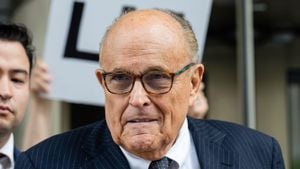Scott Bessent's nomination as Treasury Secretary by Donald Trump marks a significant turn not just politically but also socially. It’s big news on Wall Street, where many are breathing easier with Bessent at the helm. You see, Bessent isn't just any hedge fund manager; he's the founder of Key Square Group and previously served as the chief investment officer at Soros Fund Management. His extensive background gives him insight on global economic trends, which is what the financial markets desperately want right now.
When Trump first announced the nomination, market reactions were swift. Shares climbed, and the yield on the 10-year Treasury dropped, signaling relief among investors worried about inflation and economic stability. This quick response suggests Bessent is seen as someone who can possibly steer the economy on solid ground. He supports pro-fiscal policies and maintains conventional Republican views—pro-deregulation, pro-fiscal discipline, and backing the strong dollar. Such policies are often music to Wall Street's ears, and his appointment has been widely welcomed.
Interestingly, Bessent would not only make waves with his policies but also with his identity. If confirmed, he will be the first openly gay cabinet secretary appointed by any Republican president. A graduate of Yale University, he embodies part of what many perceive as the ambitious American Dream, and Trump has noted Bessent’s expertise as being invaluable at this juncture, underscoring his strategic importance. After all, having someone who knows the financial world inside out could serve as the right bridge between the Trump administration's often controversial policies and the financial markets.
While Bessent is generalizing support for some of Trump’s economic strategies, he is also eager to create balance. He has publicly addressed the issues concerning trade tariffs, often viewing them as negotiation tools rather than final policy measures—a spin some hope could alleviate fears of escalated trade wars. Bessent emphasized this perspective during interviews, noting, “At the end of the day, he’s a free trader.” His stance aims to assure investors and market analysts alike, managing expectations around Trump’s future actions.
His connection to Trump isn't new. Bessent has been one of Trump's economic advisors during the previous campaign, making him familiar with the president's modus operandi. Despite the uneasiness many feel about Trump’s style—marked by unpredictability—Bessent’s role may temper some of those volatility concerns. After all, he possesses the unique capability to respond to Trump's aggressive tendencies with necessary economic rationality.
Beyond financial expertise, Bessent's track record of political contributions raises eyebrows. Though he has donated substantially to Republican causes, he isn't wholly aligned with the party's platform, having previously donated to Democratic candidates as well. This dual affiliation might suggest Bessent will prioritize economic growth and strengthening financial markets, rather than strict party lines.
Looking at his personal life, Bessent is married to John Freeman, and together they have two children. Their family dynamic and Bessent’s open identification as gay present another layer to his nomination, especially considering the contrasting policies of the Trump administration. While Trump's record on LGBTQ+ rights isn’t considered progressive by any means, Bessent seems willing to navigate his identity within the political arena without compromising the fundamental aspects of his role.
Despite stands on fiscal responsibility, Bessent faces the inherent challenge of balancing Trump's sometimes radical policies with established economic principles and market stability. Investors are clearly pushing for continuity and stability over the “business as usual” vibes from many of Trump’s prior cabinet appointments. Whether Bessent will be able to navigate this tricky territory remains to be seen. His ability to keep both the markets and the president content could determine his success.
Undoubtedly, areas such as tax cuts will be part of the discussion front, as Bessent seeks to promote ideas around making Trump's first-term cuts permanent—an idea he believes could keep economic momentum going. His statements concerning tariffs as negotiation tools also play well with fiscal conservatives who fear overly punitive measures might destabilize the economy.
All this sets the stage for what promises to be either smooth sailing or turbulent waters. Critics of Trump worry over potential trade wars and economic disruption if tariffs escalate. Bessent, on the flip side, has tried to frame tariffs as beneficial negotiation strategies rather than threats. Something tells you he might even play both sides to represent broader economic interests over raw partisan politics.
At the core, Scott Bessent’s appointment could reshape the narrative around several economic policies with the power to influence Wall Street and beyond. His rich background, combined with his dual political affiliations, could allow him to fashion strategies appealing to both liberal and conservative philosophies. With everything from inflation concerns to the global economy to manage, how well he'll juggle these multiple roles will be the crux of his legacy at Treasury should he pass through Senate confirmation.
This blend of fiscal expertise and personal narrative makes Scott Bessent one to watch as he potentially steps onto the national stage as Treasury Secretary. His approach might set precedent not only for economics but also for diversity within the corridors of Republican power. Time will tell if Bessent can hold the line between market expectations and the unpredictable nature of Trump's policies, but one thing's for sure: the financial world is poised with eager anticipation as they await the first moves from this newly nominated Treasury Secretary.



